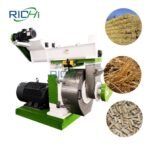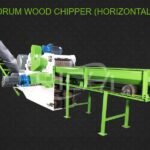Grass pellet machines have gained significant popularity worldwide due to the increasing demand for sustainable biomass fuel and animal feed solutions. However, the price of these machines can vary considerably across different regions. This article explores the factors contributing to these price variations and provides an overview of the price ranges in various parts of the world.
Factors Influencing Regional Price Variations
Several key factors contribute to the price differences of grass pellet machines in different regions:
- Manufacturing Costs
The cost of production, including labor and raw materials, varies significantly between countries. For instance, manufacturing costs in China are generally lower than in Western countries, which can lead to lower prices for Chinese-made machines. - Import Duties and Taxes
Countries may impose different import duties and taxes on machinery, which can substantially affect the final price of imported grass pellet machines. - Transportation Costs
The cost of shipping large machinery can be significant and varies based on the distance between the manufacturer and the buyer. This can lead to higher prices in regions far from major manufacturing hubs. - Market Demand
Regions with higher demand for grass pellet machines may see more competitive pricing due to increased competition among suppliers. - Technological Advancements
Some regions may have access to more advanced technology, which can influence the price of high-end grass pellet machines. - Local Regulations
Environmental and safety regulations can vary by region, potentially requiring additional features or certifications that impact the machine’s price.
Related post:https://www.richipelletmachine.com/alfalfa-pellet-machine-for-sale/
Regional Price Overviews
- China
China is one of the largest manufacturers of grass pellet machines, often offering the most competitive prices globally.
- Small-scale machines (50-500 kg/hour): $1,000 – $10,000
- Medium-scale machines (500-1000 kg/hour): $10,000 – $50,000
- Large-scale industrial machines (1-5 tons/hour): $50,000 – $200,000+
- North America (USA and Canada)
Prices in North America are generally higher due to increased labor costs and stricter regulations.
- Small-scale machines: $5,000 – $20,000
- Medium-scale machines: $20,000 – $100,000
- Large-scale industrial machines: $100,000 – $500,000+
- Europe
European prices are often similar to North American prices, with some variations between countries.
- Small-scale machines: €4,000 – €18,000
- Medium-scale machines: €18,000 – €90,000
- Large-scale industrial machines: €90,000 – €450,000+
- Southeast Asia (excluding China)
Prices in Southeast Asian countries like Vietnam or Thailand are often lower than Western prices but higher than Chinese prices.
- Small-scale machines: $2,000 – $15,000
- Medium-scale machines: $15,000 – $70,000
- Large-scale industrial machines: $70,000 – $300,000+
- Africa
Prices in African countries can vary widely depending on import costs and local manufacturing capabilities.
- Small-scale machines: $3,000 – $18,000
- Medium-scale machines: $18,000 – $80,000
- Large-scale industrial machines: $80,000 – $350,000+
- South America
Prices in South American countries are often influenced by import costs and local economic conditions.
- Small-scale machines: $3,000 – $18,000
- Medium-scale machines: $18,000 – $80,000
- Large-scale industrial machines: $80,000 – $350,000+
Case Study: Price Comparison for a Medium-Scale Machine
Let’s consider a medium-scale grass pellet machine with a capacity of 800 kg/hour:
- China: Approximately $30,000
- USA: Approximately $70,000
- Germany: Approximately €65,000 (roughly $75,000)
- Vietnam: Approximately $50,000
- Brazil: Approximately $60,000
This comparison demonstrates the significant price variations across regions for similar machines.
Impact of Regional Variations on Buyers
The substantial price differences between regions can have several implications for buyers:
- Cross-Border Purchasing
Some buyers may choose to purchase machines from regions with lower prices, despite potential challenges with shipping, customs, and after-sales support. - Local Manufacturing Development
Countries with high import prices for grass pellet machines may see an increase in local manufacturing efforts to provide more affordable options. - Quality Considerations
Buyers must balance price considerations with quality assurance, as lower-priced machines from some regions may not meet the same quality standards as higher-priced alternatives. - Total Cost of Ownership
While initial purchase prices may vary, buyers should consider the total cost of ownership, including shipping, installation, maintenance, and operational costs, which can vary significantly between regions.
Conclusion
The price of grass pellet machines can vary substantially across different regions, with differences of up to 200% or more for similar capacity machines. These variations are driven by factors such as manufacturing costs, import duties, transportation expenses, and local market conditions.While Chinese manufacturers often offer the most competitive prices globally, buyers must carefully consider factors beyond just the initial purchase price. Quality, after-sales support, compliance with local regulations, and long-term operational costs should all factor into the decision-making process.
As the demand for sustainable biomass solutions continues to grow worldwide, we may see some narrowing of these price gaps. However, regional variations are likely to persist due to inherent differences in manufacturing capabilities, economic conditions, and regulatory environments.
For potential buyers, thorough research and careful consideration of all factors – not just the upfront cost – are essential when choosing a grass pellet machine. By understanding these regional price variations and their underlying causes, buyers can make more informed decisions that balance cost-effectiveness with quality and long-term value.


